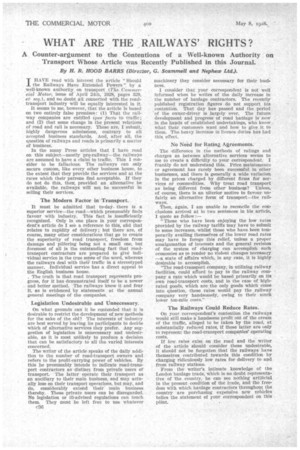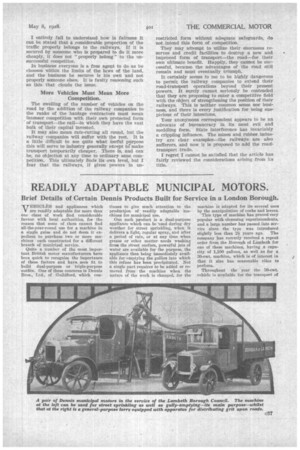WHAT ARE THE RAILWAYS' RIGHTS?
Page 64

Page 65

If you've noticed an error in this article please click here to report it so we can fix it.
A Counter-argument to the Contentions of a Well-known Authority on Transport Whose Article was Recently Published in this Journal.
By H. R. HOOD BARRS (Director, G. Scammell and Nephew Ltd.).
IRA"
read with interest the article " Should
the Railways Have Extended Powers" by a well-known authority. on transport (The Commercial . Motor, issue of April 24th, 1928, pages 329, et eeg.),and no doubt .01 conneeted with the roadtransport industry will be equally interested in it.
It seems to me, however, that the article is based on two entirely false premises:' (1) That the railway companies are entitled ipso" facto to traffic; and (2) that some change in the present relations of road and rail is necessary. These are, I submit, highly dangerous admissions, contrary to all accepted business standards. And, after all, the question of railways and roads is primarily a matter of business.
In the many Press articles that I have read on this subject—mostly pro-railway—the railways are assumed to have a claimi to traffic. This I consider to be fallacious. The• railways can only secure custom, like every other business house, to the extent that they provide the services and at the rates which their patrons find acceptable. If they do not do this, then, provided an alternative be available, the railways will not be successful in selling their services.
The Modern Factor in Transport.
It must be admitted that to-day. there is a superior service—the road—which presumably finds favour with industry. This fact is insufficiently recognized. Only In one place in your correspondent's article do I see a reference to this, afid that relates to rapidity of delivery;• but there are, of course, many other considerations that go to create the superiority of road transport, freedom from damage and pilfering being not a small one, but foremost of all is the outstanding fact that roadtransport contractors are prepared to give Individual service in the true sense of the word, whereas the railways deal with their: traffic in a stereotyped manner. Individual service has a direct appeal to the English business house.
. The truth is that road transport represents progress, for it has demonstrated itself to be a newer and better method. The railways know it and fear It, as is evidenced by statements at the annual general meetings of the companies.
Legislation Undesirable and Unnecessary.
On what grounds can it be contended that it is desirable to restrict the development of new methods for the sake of the old? The interests of industry are best served by leaving its participants to decide which of alternative services they prefer. Any suggestion of legislation is unnecessary and undesirable, as it is most unlikely to produce a decision that can be satisfactory to all the varied interests concerned.
The writer of the article speaks of the daily addition to the number of road-transport owners and refers to the profit-carrying power of vehicles. By this he presumably intends to indicate road-transport contractors as distinct from private users of transport. The latter operate their transport as an ancillary to their main business, and may actually lose on their transport operations, but may, and do, considerably extend theirmain business thereby. These private users can be disregarded. No legislation or ill-advised regulations can touch them. They must be left free to use whatever
e36 machinery they consider necessary for their business.
I consider that your correspondent is not well informed when he writes of the daily increase in the number of haulage contractors. The recently published registration figures do not support his contention. That day has passed and the period of the owner-driver is largely over. The future development and progress of road haulage is now in the hands of established undertakings, who know what their customers want and how to give it to them. The heavy increase in licence duties has had this effect,
No Need for Rating Agreements.
The difference in the methods of ratings and charges as between alternative services seems to me to create a difficulty to your correspondent. I frankly do not understand this. Price maintenance or agreement has rarely been successful in other businesses, and there is generally a wide variation in the prices charged by different firms for services or commodities. Why treat road transport as being different from other business? Unless, of course, there is an ulterior motive to favour unfairly an alternative form of transport—the railways.
Then, again, I am unable to reconcile the conclusions arrived at in two Sentences in his article, I quote as follow:— " Those who have been enjoying the low rates provided by the railway tariffs may have to submit to some increases, whilst those who have been temporarily availing themselves of the lower road rates may have to forego this relief, unless a proper amalgamation of interests and the general revision of the system of charging can accomplish such economies as to render no violent changes necessary —a state of affairs which, in any case, it is highly desirable to accomplish.
"The road-transport company, in utilizing railway facilities, could afford to pay to the railway company a rate which would be based primarily on its own road-transport costs, and in the case of highrated goods, which are the only goods which come into qhestion, these rates would pay the railway company very handsomely, owing to their much lower ton-mile costs."
The Railways Could Reduce Rates.
On your correspondent's contention the railways would still make a handsome profit out of the cream of the traffic, alleged to be taken by the road, at substantially reduced rates, if these latter are only to represent the road-transport companies' operating costs.
If low rates exist on the road and the writer of the article should consider these undesirable, it should not be forgotten that the railways have themselves contributed towards this condition by charging ridiculously low rates for delivery to and from railway stations.
From the writer's intimate knowledge of the London haulage trade, which is no doubt representative of the country, he can see nothing artificial in the present condition of the trade, and the freedom with which haulage contractors throughout the country are purchasing expensive new vehicles belies the statement of your correspondent on this point. I entirely fail to understand how in fairness it can be stated that a considerable proportion of the traffic properly belongs to the railways. If it is secured by someone who is prepared to do it more cheaply, it does not "properly belong" to the unsuccessful competitor.
In business everyone is a free agent to do as be chooses within the limits of the laws of the land, and the business he secures is his own and not properly someone else& It is faulty reasoning such as this that clouds the issue.
More Vehicles Must Mean More Competition.
The swelling of the number of vehicles on the road by the addition of the railway companies to the ranks of the haulage contractors must mean intenser competition with their own protected form of transport—the rail—in Which they have the vast bulk of their capital invested.
It may also mean rate-cutting all round, but the railway companies will suffer with the rest. It is a little difficult to see quite what Useful purpose this will serve to industry generally except to make transport temporarily cheaper. There is, and can be, no objection at any time to ordinary sane competition. This ultimately flrids its own level, but I fear that the railways, if -given powers in un restricted form without adequate safeguards, do not intend this form of competition.
They may attempt to utilize their enormous reserves and credit facilities to destroy a new and improved form of transport—the road—for their own ultimate benefit. Happily, they cannot be successful, because the advantages of the road still remain and must eventually triumph.
It certainly seems to me to be highly dangerous to permit the railway companies to extend their road-transport operations beyond their present powers. It surely, cannot seriously be contended that they are proposing to enter a competitive field with the object of strengthening the position of their railways. This is neither common sense nor business, and there is every justification for being suspicious of their intentions.
Your anonymous correspondent appears to be an advocate of bureaucracy in its most evil and meddling form. State interference has invariably a crippling influence. The mines and rubberindustry are clear examples—the railways are also sufferers, and now it is proposed to add the roadtransport trade.
I regret I cannot be satisfied that the article has fairly reviewed the considerations arising from its title.
























































































































